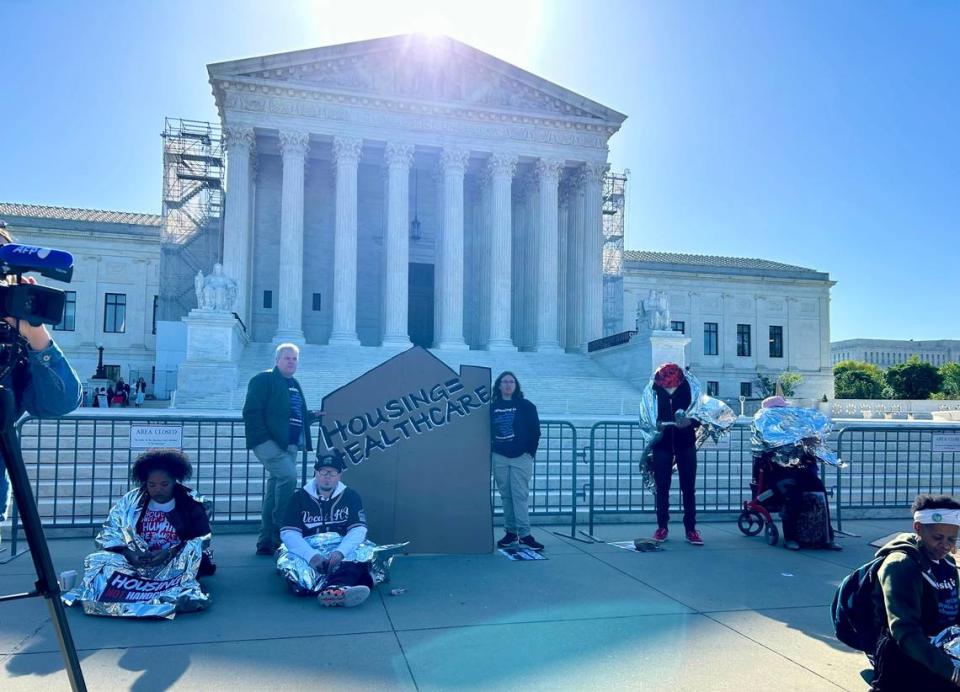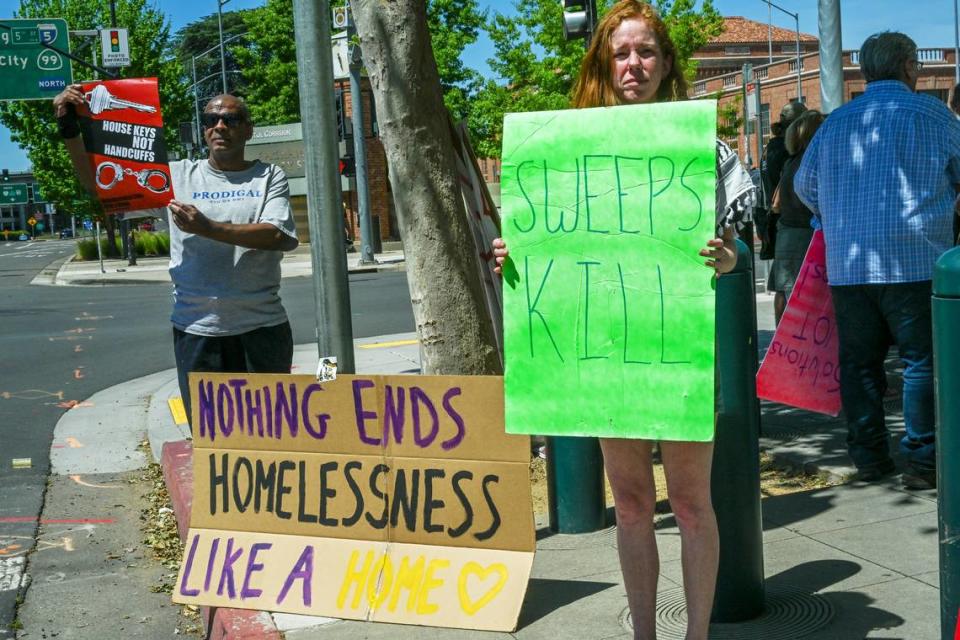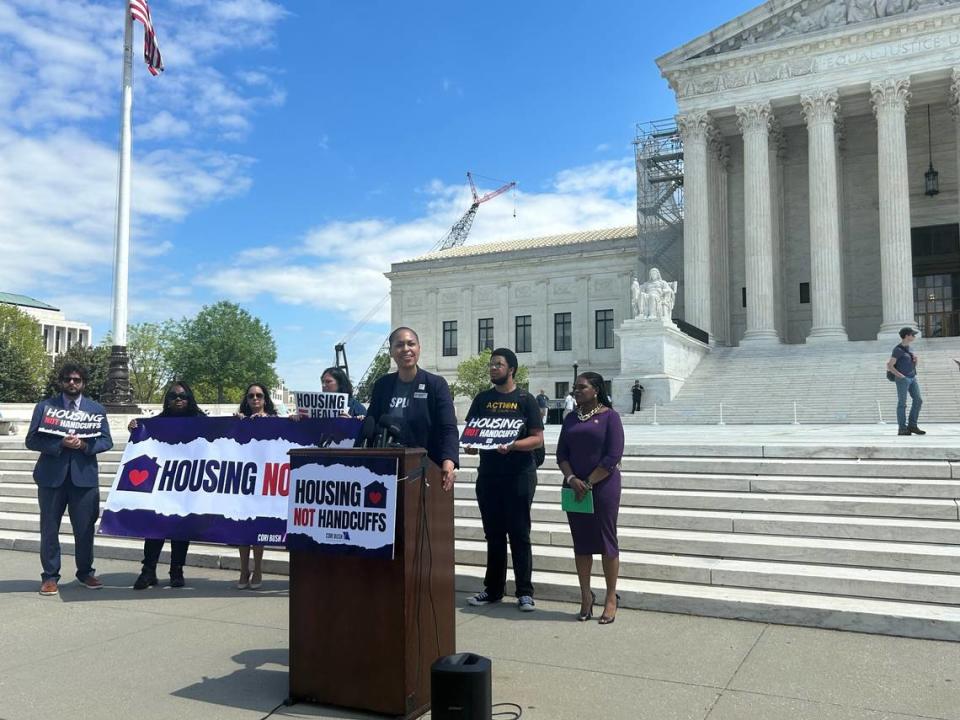After Supreme Court’s contentious homelessness ruling, what’s next for California cities?
In light of the Supreme Court’s June 28 decision, which ruled that state and local governments could enforce ordinances that ban homeless people from camping and occupying public land, municipalities in California’s Central Valley are reviewing court cases and policies shaping their own approach to encampments and outdoor sleeping.
The Grants Pass v. Johnson ruling overturns precedent set by the Martin v. Boise case decided by the U.S. Court of Appeals for the 9th Circuit, which decides cases from several Western states including California. The Martin decision held that governments could not enforce anti-camping legislation when there are not enough shelter beds available for every homeless person under their jurisdiction.
In a statement, Chione Flegal and Chris Martin, who respectively serve as the executive director and policy director of the advocacy organization Housing California, expressed frustration with the decision and claimed it will criminalize being homeless in the state.
“The devastating ruling opens the door for local governments to make it illegal for our unhoused neighbors to rest in public areas, even when there is no other place for them to go,” they wrote. “At a time when Californians put solving homelessness at the top of their priorities, we should not enact policies that exacerbate the crisis.”
The ruling holds that state and local governments may enact total bans on encampments or outside sleeping, but they are not compelled to do so if lawmakers do not approve such policies. It is currently unlikely that the state Legislature would approve an outright prohibition on camping or sleeping outside. In April, the California Senate’s Public Safety Committee voted to reject a bill that would allow law enforcement to impose penalties on people who camp within 500 feet of school grounds, transit stops, and other open public spaces. Such legislation would have still complied with the Martin ruling, which prohibited outright camping bans without shelter space but did not bar partial restrictions on where people could sleep outdoors.
Sacramento
After the Supreme Court ruled in favor of Grants Pass, the mayor of Sacramento stated that the city would not change its “balanced, compassionate approach” to homelessness, even though the city of Sacramento approved legislation in 2022 that allowed the removal of encampments that block sidewalks regardless of shelter bed availability. District Attorney Thien Ho filed a lawsuit in September 2023 against the city for not adequately enforcing the ordinance blocking encampments from obstructing sidewalks.
Ho’s lawsuit alleged that the city created a public nuisance and violated the state’s Fish and Game code on clean water by allowing encampment residents to pollute water bodies. A federal judge ruled in May that Ho needed to remove the public nuisance complaint from his lawsuit; the following month, Ho filed an amended version of the lawsuit that still included the previously rejected public nuisance complaint. The judge will determine whether this lawsuit can move forward in the next month.
The District Attorney’s office said it could not comment on whether the Supreme Court’s decision may impact the pending litigation, but Ho affirmed that he supports the Grants Pass ruling
“This decision underscores the importance of finding compassionate and effective solutions that balance the needs of all residents,” Ho wrote in a statement. “The ‘Martin v. Boise’ experiment can no longer be used as an excuse to do nothing. We must now redouble our efforts to provide comprehensive services and compassionate enforcement with an approach guided by empathy, respect, and a commitment to creating a healthier and safer Sacramento for everyone.”
Chico
In 2022, the city of Chico settled Warren v. Chico, a lawsuit filed by local homeless people who complained that the city government violated the Martin decision by enforcing ordinances that banned “sleeping, sitting, lying, resting and simply existing in the City of Chico” without adequate shelter space. At the time, there were only 120 shelter beds in Chico, a far fewer number than the 500 people experiencing homelessness in the city. Chico agreed to build a new non-congregate homeless shelter and add anywhere from 50 to 177 individual Pallet shelters, often known as “tiny homes.”
Chico City Manager Mark Sorensen said in a statement that the Grants Pass ruling may impact Chico’s approach to addressing homelessness in the city, but the order signed by a federal judge in the Warren case will remain in place unless a court changes or overrules it.
“The federal court order in place (AKA: Warren Settlement Agreement) severely restricts and delays the City of Chico’s ability to enforce a variety of historically normal, reasonable and common laws to achieve public safety and public health objectives, and to properly maintain public spaces,” Sorenson wrote.
The Chico City Council will meet on July 9 to discuss next steps given the Supreme Court decision. In 2023, the Butte County Continuum of Care reported that there were 925 people experiencing homelessness in Chico.
The Legal Services of Northern California organization, whose attorneys represented the plaintiffs in the Warren case, wrote in a June 28 statement that the firm is confident that the city will continue to abide by the Warren ruling by increasing access to shelter space and allowing unsheltered homeless people to keep their property safe when beds are unavailable. The organization is still wary about the ruling’s implications for the treatment of homeless people in the state.
“While the lawsuit that spurred the settlement agreement was based in part on the holding of Martin v. Boise, the Supreme Court’s holding today in City of Grants Pass v. Johnson neither negates the Chico settlement agreement, nor does it disturb the rights of unhoused people, or any people, to be lawfully present in public spaces,” read the statement. “LSNC is concerned that the decision will result in some localities overreaching with anti-homeless ordinances seeking to degrade the rights of unhoused Californians and further criminalize homelessness.”
Stockton
In 2022, the Stockton City Council approved an ordinance prohibiting camping on or near “critical infrastructure areas,” including waterways, properties deemed functionally vital to to the city, hospitals, bridges, government buildings, roads, train tracks, parks, natural gas pipes, and electrical wires. Though the areas covered by the ordinance were broad-sweeping, the law was still permissible under Martin since Stockton did not ban all camping. The ordinance also bans camping paraphernalia — which often constitutes the property of homeless people, such as beds, sleeping bags, hammocks, and cooking facilities — from these areas.
The city of Stockton is currently reviewing its approach to homelessness and encampments “with an eye towards aligning city policies and procedures with the court’s decision,” City Manager Harry Black said. The review will involve collaboration between staff representing different municipal departments, and the City Council expects an update on their findings on July 9.
Four hundred thirty beds for homeless residents are currently under construction, and according to City Manager Communications Support specialist Rosie Calderon. A report released this year by the San Joaquin Continuum of Care estimated that about 900 homeless people live in Stockton.
Folsom
The city of Folsom’s anti-camping ordinances state that all camping, whether on public or private property, is unlawful unless it occurs on designated public campsites, sites approved by the city during special events, rear or side yards of homes when permitted by the homeowner, or for short periods of time in vehicles or motor homes in select spaces. The ordinance also states that leaving unattended property on unauthorized camp sites is illegal.
It was previously difficult for the city to enforce parts of its anti-camping ordinance due to the Martin ruling. But now that the Grants Pass case has overturned that decision, the city will resume enforcing the anti-camping laws, Folsom Communications Director Christine Brainerd confirmed. The city police department formed a Homeless Outreach Team on July 1 to ensure people comply with the anti-camping ordinances and engage with those who violate them.
Brainerd said in a statement that though the ruling permits the city to enforce these anti-camping policies, Folsom will continue to focus on alleviating burdens and barriers to housing that homeless people face. She added that anti-camping ordinances apply to everyone regardless of whether or not they are homeless, and that enforcing such legislation ensures clean parks, trails, and shopping areas for the community.
“The Supreme Court decision allows the City to resume enforcing its anti-camping ordinance which, similar to many other cities’ ordinances, is focused on conduct and behavior and not homelessness,” Brainerd wrote. “Additionally, the Supreme Court’s decision has no impact on the City’s ongoing efforts to provide assistance and resources to homeless individuals seeking temporary or permanent shelter.”
As the Grants Pass ruling allows local law enforcement agencies to pursue fines against homeless people sleeping outside or remove them from encampments regardless of shelter space, it is unclear how the cities will address individuals who do not have access to open shelter beds.



